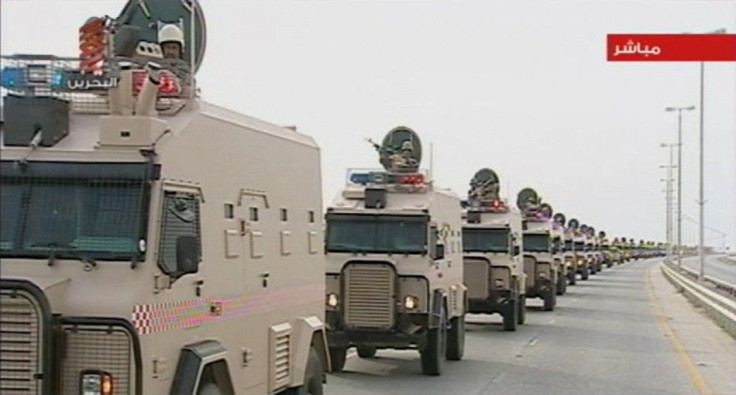Bahrain: Another theater of sectarian conflict taking shape in the Middle East?

The decision by Saudi Arabia and other GCC countries to send armed forces to Bahrain to help quell protests is bad enough; but worse is the explanation that the move is in accordance with a Gulf Cooperation Council (GCC) defense pact.
Saudi Arabia sent about 1,000 soldiers to Bahrain after the Shiite protests gained fresh momentum over the weekend. The United Arab Emirates has pledged to send around 500 police to the kingdom, where a nascent sectarian conflict is taking shape.
The Saudi move will aggravate the nature of the Bahraini conflict in the long term even if it succeeds in stopping the budding rebellion in its tracks for now.
Saudi Arabia, which feels threatened by the turn of events in its tiny neighbor, has said the troop movement was aimed at protecting the Bahraini government installations from possible attacks by protesters. Riyadh also said Bahraini authorities requested their help and that the move had the wider GCC sanction.
The Saudi Press Agency said the GCC move was in accordance with the GCC defense pact, which states that “any harm done to the security of a member state is considered a harm done to the security of all members”.
The question is how a largely peaceful, purely unarmed popular protest can be termed as an external threat to the stability and security of a GCC country.
Unlike in Libya the protesters in Bahrain have been unarmed, and unlike even in Egypt, the protesters were not gunning for the head of the ruler. The Bahraini protesters' major demand is constitutional reform and the institution of a constitutional monarchy. They also want fair representation of the Shiite majority in the government and jobs.
Saudi Arabia, and the Bahraini ruing family too, suspects the hand of Iran in the popular uprising which took a leaf out of the successful campaigns in Tunisia and Egypt in recent months. The majority of Bahrainis are Shiite though the ruling Khalifa clan is Sunni. The fear of Shiite Iran stoking sectarian violence in Bahrain is understandable and the fall of Bahrain to Shiite forces will change regional power balance.
However, by choosing to send troops to Bahrain the GCC has taken a wrong step. The move affirms GCC's resolve to suppress any internal revolt in any of the GCC countries by unleashing the combined firepower of its armed forces. This is nothing less than directing military power against citizens peacefully protesting for their rights in the guise warding off external threat to the regime.
If the GCC forces take on Bahraini protesters on the streets, it will invariably escalate the situation from being a popular protest for reform into a full-fledged sectarian conflict in the region.
The protesters have already revealed how they view the development. We consider the entry of any soldier or military machinery into the Kingdom of Bahrain's air, sea or land territories a blatant occupation, the opposition groups said in a statement.
This real threat about the entry of Saudi and other Gulf forces into Bahrain to confront the defenseless Bahraini people puts the Bahraini people in real danger and threatens them with an undeclared war by armed troops.
Past Middle Eastern crises have shown that the road to sectarian conflict is easy to tread, but once first blood is drawn, a retreat to normalcy is impossible.
Take the case of Lebanon. It's portentous enough when a government trains its guns on its owns citizens, but when it's done with the help of a foreign government, it's no less than a recipe for disaster. Inviting external forces to your own land to solve what is essentially an internal problem can only lead to long-term sectarian strife, militarization of factions and deeply entrenched political division.
Is another theater of intense sectarian conflict shaping up in the deserts?
© Copyright IBTimes 2024. All rights reserved.





















